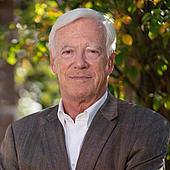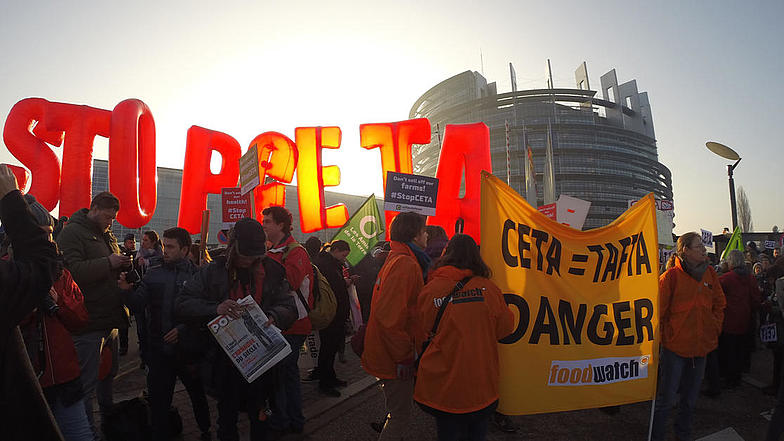foodwatch has been warning the public about the lack of transparency and democratic legitimacy of CETA committees. In February 2021 foodwatch wrote a letter to the European Commission, sharing information on the shortcomings of CETA that had been identified in a legal opinion. However, the Commission is refusing to acknowledge these shortcomings.
Since the beginning of its campaign against CETA, the trade agreement between the EU and Canada, foodwatch has criticised the lack of transparency and democratic legitimacy of the agreement. At the centre of foodwatch's criticism lies the extensive powers of the so-called "treaty committees". In recent months foodwatch has been writing directly to the Commission to address its concerns. The information shared in this exchange of letters is based on a legal opinion by Dr Wolfgang Weiß, professor of international law at the University of Speyer, and describes a number of serious democratic deficits in CETA. Professor Weiß is also representing foodwatch in a case that was filed against the agreement in 2016 with the German Constitutional Court in Karlsruhe. The decision is still pending, and an oral hearing is expected to take place in 2021.
CETA will freeze standards of consumer protection
foodwatch is convinced that the EU’s trade agreement with Canada (CETA) is a threat to food safety and public health. Health inspection standards, such as the frequency of import controls, "can be lowered at any time" by decisions of the CETA joint committee. Such decisions could undermine sanitary and phytosanitary standards and result in insufficient health protection for consumers in the EU. The legal opinion by Professor Weiß has confirmed these concerns.
CETA, as a so-called modern trade agreement, not only delivers tariff reductions, but also seeks to eliminate "non-tariff barriers" (NTBs). These NTBs – including standards of consumer, health and environmental protection – can be recognised as "equivalent" under the agreement in order to reduce international trade impediments. However, these decisions are made not by elected representatives, but by government officials in the CETA committees. Moreover, any decision made by these CETA committees cannot be unilaterally overturned by the EU, a fact that Dr Weiß identified as particularly concerning. For example, even if the EU states were to agree to tighten mutually recognized safety standards for pesticides through the committees, this decision could not apply to Canadian products without Canadian consent. This is because any rules that contradict CETA commitments are "automatically a violation of international law." Thus, CETA could "effectively freeze standards of protection."

CETA must be stopped and replaced by a trade deal that is based on transparent negotiations, creates fair trade conditions and serves the prosperity of all European citizens instead of large corporations.founder of foowatch
The EU Commission must address CETA criticism
In February foodwatch wrote a letter to the DG Trade at the EU Commission, sharing its concerns about the lack of transparency and democratic legitimacy of the CETA committees. However, the Commission’s reply, signed by Matthias Jorgensen, Head of Unit for USA and Canada at DG Trade, did not address the arguments put forward by foodwatch and therefore failed to ease the concerns that the CETA joint committee will be able to amend the agreement and lower food and health standards in the EU.
It is shocking that the Commission would ignore a legal opinion identifying the shortcomings of CETA. In doing so, the Commission is creating distrust among EU citizens towards its own trade policy and feeding further Euroscepticism.founder of foodwatch
The Commission’s claim that "the EU and the EU alone" determines the standards of health protection for products is simply false. In addition, the Commission also failed to acknowledge the fact that the CETA committees could not be considered transparent unless detailed minutes of its meetings were published. This transparency is especially relevant because, although the committee lacks democratic legitimacy and does not consist of elected representatives, it can make far-reaching decisions.
The fact that the Commission was unable to counter foodwatch’s criticism is worrying. There is either no awareness of the shortcomings of CETA on the European stage or – the far more likely scenario – there is simply no interest in addressing the arguments against it and the threats it poses.
Sources and further information:
- Legal Opinion: Transparency, Decision-Making Powers and Democratic Accountability in CETA prepared on behalf of foodwatch by Prof. Wolfgang Weiss, University of Speyer (updated version 07/2021)
- Exchange of letters between foodwatch and DG Trade
- Press release from 7 July 2021 regarding the correspondence between foodwatch and DG Trade
